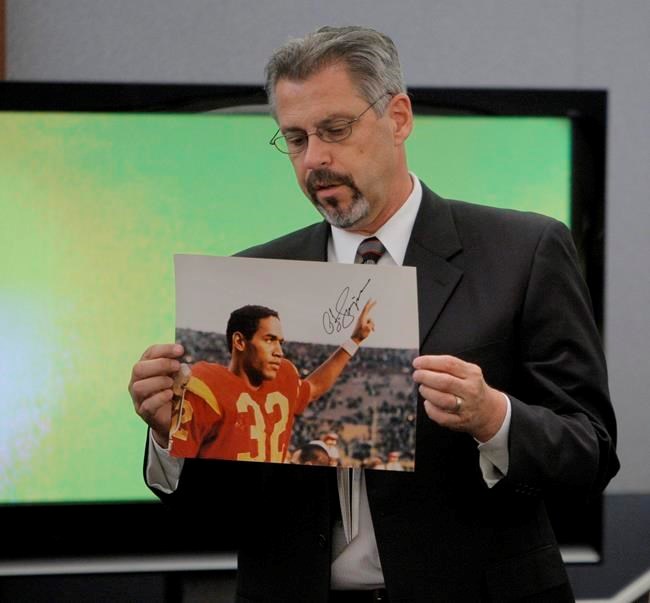LOVELOCK, Nev. — O.J. Simpson was granted parole Thursday after more than eight years in prison for a Las Vegas hotel-room heist, successfully making his case for freedom in a nationally televised hearing that reflected America's enduring fascination with the former football star.
Simpson, 70, could be released as early as Oct. 1. By then, he will have served the minimum of his nine-to-33-year sentence for a bungled attempt to snatch sports memorabilia and other mementos he claimed had been stolen from him.
During the more than hour-long hearing on live TV, Simpson was, by turns, remorseful, jovial and defensive, heatedly insisting the items taken in the armed robbery were "my stuff." At one point, he set off a storm of sarcasm and mockery on social media when he said: "I've basically spent a conflict-free life, you know."
All four parole commissioners who conducted the hearing voted for his release after a half-hour of deliberations. They cited, among other things, the low risk he might commit another crime, his community support and his release plans, which include moving to Florida.
"Thank you, thank you, thank you," Simpson said quietly as he buried his head on his chest with relief. As he rose from his seat to return to his prison cell, he exhaled deeply.
Then, as he was led down a hall, the Hall of Fame athlete and murder defendant in the 1995 "Trial of the Century" raised his hands over his head in a victory gesture and said: "Oh, God, oh!"
Inmate No. 1027820 made his plea for freedom in a stark hearing room at the Lovelock Correctional Center in rural Nevada as the parole commissioners questioned him via video from Carson City, a two-hour drive away.
At the hearing, Simpson insisted he never meant to hurt anyone, never pointed a gun and didn't make any threats during the holdup of two sports memorabilia dealers.
"I thought I was glad to get my stuff back, but it just wasn't worth it," he told the board. "It wasn't worth it, and I'm sorry."
Simpson was widely expected to win parole, given similar cases and his good
Even one of the dealers Simpson robbed, Bruce Fromong, testified on his behalf, telling the parole board that Simpson deserved to be released so he could be with his family.
"He is a good man. He made a mistake," Fromong said, adding the two remain friends.
Arnelle Simpson, at 48 the eldest of Simpson's four children, told the board, "We recognize that he is not the perfect man." But she said he has been "a perfect inmate, following all the rules and making the best of the situation."
"We just want him to come home, we really do," she said.
Simpson said that he has spent his time in prison mentoring fellow inmates, often keeping them out of trouble, and that he has become a better person during those years.
"I've done my time. I've done it as well and respectfully as I think anybody can," he told the board.
Asked if he was confident he could stay out of trouble if released, Simpson replied that he learned a lot from an alternative-to-violence course he took in prison and that in any case he has always gotten along well with people.
His remark about his "conflict-free life" instantly lit up social media with incredulous comments.
Several major TV networks and cable channels — including ABC, CBS, NBC, CNN, Fox, MSNBC and ESPN — carried the proceedings live, just as some of them did two decades ago during the Ford Bronco chase that ended in Simpson's arrest, and again when the jury in the murder case came back with its verdict.
Simpson said if released he plans to return to Florida to be near two of his adult children.
"I could easily stay in Nevada, but I don't think you guys want me here," he joked at one point.
"No comment, sir," board chairwoman Connie Bisbee replied.
Authorities must still work out the details of Simpson's release with Florida officials, including where he will live and what rules he must follow.
An electrifying running back dubbed "The Juice," Simpson won the Heisman Trophy as the nation's best college football player in 1968 and went on to become one of the NFL's all-time greats.
The handsome and charismatic athlete was also a "Monday Night Football" commentator, sprinted through airports in Hertz rental-car commercials and built a Hollywood career with roles in the "Naked Gun" comedies and other movies.
All of that came crashing down with his arrest in the 1994 slayings and his trial, a gavel-to-gavel live-TV sensation that transfixed viewers with its testimony about the bloody glove that didn't fit and stirred furious debate over racist police, celebrity justice and cameras in the courtroom.
Last year, the case proved to be compelling TV all over again with the ESPN documentary "O.J.: Made in America" and the award-winning FX miniseries "The People v. O.J. Simpson: American Crime Story."
In 1997, Simpson was found liable in civil court for the two killings and ordered to pay $33.5 million to survivors, including his children and the Goldman family.
Then a decade later, he and five accomplices — two with guns — stormed a hotel room and seized photos, plaques and signed balls, some of which never belonged to Simpson.
Simpson was convicted in 2008, and the long prison sentence brought a measure of satisfaction to some of those who thought he got away with murder.
___
Associated Press writers John Antczak, Christopher Weber and Michael Balsamo in Los Angeles and Terence Chea in Lovelock contributed to this report.
Ken Ritter, The Associated Press

